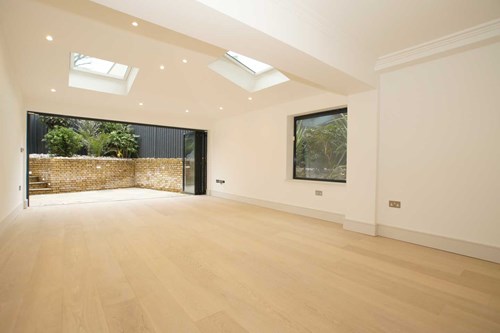
Kitchen refurbishments are big business these days. Builders’ merchants are setting up kitchen showrooms all round the country, but are they offering your customers the right products for the situation when it comes to flooring? As the active expert on the spot, builders have the opportunity to help householders to correctly choose flooring that will last and perform to expectations.
With the fashion to have bi-fold doors opening out onto gardens, whichever flooring is chosen will have to stand up to extra wear and tear, above and beyond the moisture, spills and household ‘traffic’ of a normal kitchen. Engineered wood flooring is a good choice for this type of situation, as it has less movement potential than other types of flooring. The depth of the engineered flooring product recommended will depend on whether it is being laid over concrete or onto joists. On concrete, a 14mm engineered flooring product will suffice.
The customer’s likely input on care is also key to getting the right flooring. Most engineered wood flooring needs only occasional maintenance but each product type requires a slightly different regime. Some products are spill-resistant; others can be lightly sanded if needed. But for all engineered flooring products, it’s better to advise the householder not to use a steam cleaner of any kind, no matter what the machine’s manufacturer states.
Solid wood flooring is also still popular, particularly Oak, though with varying availability affecting the marketplace internationally, getting the grade and length of boards required is perhaps more difficult than in the past. Other hardwoods, such as Beech, and suitable tropical hardwoods, can be sourced from specialist timber merchants, but sustainable sourcing and legality claims need to be thoroughly checked with your supplier and with the relevant certification organisations. Timber Trade Federation members must all adhere to the rigorous due diligence of our Responsible Purchasing Policy, and are audited annually for performance on these issues.
This topic of sustainable sourcing also applies to engineered flooring. Supply chains for these products are complex. Oak harvested in parts of Europe is often transported to China for manufacture and back again as an engineered product. Many different timber species, as well as European Oak, are imported by China for its expanding timber industries, and these come from a variety of sources around the world. Other types of wood products emanating from this part of the world have previously been found to carry incorrect claims of species content, as revealed through our research into plywoods.
Although there are many good products coming from overseas already sold by our members, The Timber Trade Federation is currently undertaking a research project to find out whether flooring product claims of species content and responsible sourcing can be relied upon, and to highlight best practice amongst our members. We want to ensure that our sector’s customers are able to buy ‘Timber you can Trust’ when it comes to flooring.






